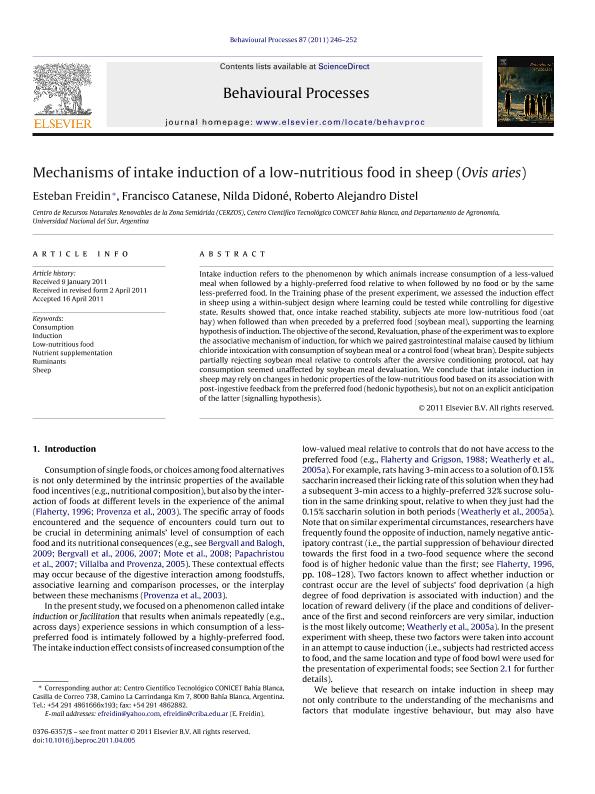Mostrar el registro sencillo del ítem
dc.contributor.author
Freidin, Esteban

dc.contributor.author
Catanese, Francisco Hernan

dc.contributor.author
Didone, Nilda Graciela

dc.contributor.author
Distel, Roberto Alejandro

dc.date.available
2019-05-16T20:14:43Z
dc.date.issued
2011-07
dc.identifier.citation
Freidin, Esteban; Catanese, Francisco Hernan; Didone, Nilda Graciela; Distel, Roberto Alejandro; Mechanisms of intake induction of a low-nutritious food in sheep (Ovis aries); Elsevier Science; Behavioural Processes; 87; 3; 7-2011; 246-252
dc.identifier.issn
0376-6357
dc.identifier.uri
http://hdl.handle.net/11336/76591
dc.description.abstract
Intake induction refers to the phenomenon by which animals increase consumption of a less-valued meal when followed by a highly-preferred food relative to when followed by no food or by the same less-preferred food. In the Training phase of the present experiment, we assessed the induction effect in sheep using a within-subject design where learning could be tested while controlling for digestive state. Results showed that, once intake reached stability, subjects ate more low-nutritious food (oat hay) when followed than when preceded by a preferred food (soybean meal), supporting the learning hypothesis of induction. The objective of the second, Revaluation, phase of the experiment was to explore the associative mechanism of induction, for which we paired gastrointestinal malaise caused by lithium chloride intoxication with consumption of soybean meal or a control food (wheat bran). Despite subjects partially rejecting soybean meal relative to controls after the aversive conditioning protocol, oat hay consumption seemed unaffected by soybean meal devaluation. We conclude that intake induction in sheep may rely on changes in hedonic properties of the low-nutritious food based on its association with post-ingestive feedback from the preferred food (hedonic hypothesis), but not on an explicit anticipation of the latter (signalling hypothesis).
dc.format
application/pdf
dc.language.iso
eng
dc.publisher
Elsevier Science

dc.rights
info:eu-repo/semantics/openAccess
dc.rights.uri
https://creativecommons.org/licenses/by-nc-sa/2.5/ar/
dc.subject
Consumption
dc.subject
Induction
dc.subject
Low-Nutritious Food
dc.subject
Nutrient Supplementation
dc.subject
Ruminants
dc.subject
Sheep
dc.subject.classification
Otras Producción Animal y Lechería

dc.subject.classification
Producción Animal y Lechería

dc.subject.classification
CIENCIAS AGRÍCOLAS

dc.title
Mechanisms of intake induction of a low-nutritious food in sheep (Ovis aries)
dc.type
info:eu-repo/semantics/article
dc.type
info:ar-repo/semantics/artículo
dc.type
info:eu-repo/semantics/publishedVersion
dc.date.updated
2019-05-14T14:02:31Z
dc.journal.volume
87
dc.journal.number
3
dc.journal.pagination
246-252
dc.journal.pais
Países Bajos

dc.journal.ciudad
Amsterdam
dc.description.fil
Fil: Freidin, Esteban. Consejo Nacional de Investigaciones Científicas y Técnicas. Centro Científico Tecnológico Conicet - Bahía Blanca. Centro de Recursos Naturales Renovables de la Zona Semiárida. Universidad Nacional del Sur. Centro de Recursos Naturales Renovables de la Zona Semiárida; Argentina
dc.description.fil
Fil: Catanese, Francisco Hernan. Consejo Nacional de Investigaciones Científicas y Técnicas. Centro Científico Tecnológico Conicet - Bahía Blanca. Centro de Recursos Naturales Renovables de la Zona Semiárida. Universidad Nacional del Sur. Centro de Recursos Naturales Renovables de la Zona Semiárida; Argentina
dc.description.fil
Fil: Didone, Nilda Graciela. Consejo Nacional de Investigaciones Científicas y Técnicas. Centro Científico Tecnológico Conicet - Bahía Blanca. Centro de Recursos Naturales Renovables de la Zona Semiárida. Universidad Nacional del Sur. Centro de Recursos Naturales Renovables de la Zona Semiárida; Argentina
dc.description.fil
Fil: Distel, Roberto Alejandro. Consejo Nacional de Investigaciones Científicas y Técnicas. Centro Científico Tecnológico Conicet - Bahía Blanca. Centro de Recursos Naturales Renovables de la Zona Semiárida. Universidad Nacional del Sur. Centro de Recursos Naturales Renovables de la Zona Semiárida; Argentina
dc.journal.title
Behavioural Processes

dc.relation.alternativeid
info:eu-repo/semantics/altIdentifier/url/https://www.sciencedirect.com/science/article/pii/S0376635711000817
dc.relation.alternativeid
info:eu-repo/semantics/altIdentifier/doi/http://dx.doi.org/10.1016/j.beproc.2011.04.005
Archivos asociados
